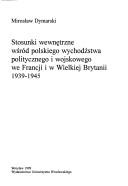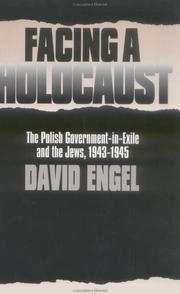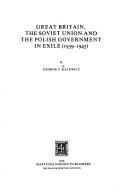| Listing 1 - 5 of 5 |
Sort by
|

ISBN: 8322919417 Year: 1999 Volume: 2162 Publisher: Wroclaw Wydawnictwo uniwersytetu wroclawskiego
Abstract | Keywords | Export | Availability | Bookmark
 Loading...
Loading...Choose an application
- Reference Manager
- EndNote
- RefWorks (Direct export to RefWorks)
Poles --- -Poles --- Ethnology --- Political activity --- Rzeczpospolita Polska (Government-in-exile) --- Rząd Rzeczypospolitej Polskiej (Government-in-exile) --- Polish Government in Exile --- Poland --- Politics and government --- -Political activity --- -Polish people --- 1918-1945 --- Poles (Nation) --- Foreign countries --- Polish people
Book
ISBN: 1907677941 9781907677946 Year: 2010 Publisher: West Midlands, England Helion & Co. Ltd.
Abstract | Keywords | Export | Availability | Bookmark
 Loading...
Loading...Choose an application
- Reference Manager
- EndNote
- RefWorks (Direct export to RefWorks)
This work examines the nature of the relationship between the British Government and the Polish Government-in-Exile, 1939-1945. The relationship was extremely difficult owing to the extremity of the time and the situations of the two governments. Before 1939 there had been little contact between Poland and Britain, however between 1939 and 1945 the two countries were joined in a common desire for the military defeat of Germany: this was virtually the only common goal that the two governments shared. Polish ambitions to see Poland restored to its pre-war frontiers were not shared with the major

ISBN: 0807820695 Year: 1993 Publisher: Chapel Hill London University of North Carolina Press
Abstract | Keywords | Export | Availability | Bookmark
 Loading...
Loading...Choose an application
- Reference Manager
- EndNote
- RefWorks (Direct export to RefWorks)
Holocaust, Jewish (1939-1945) --- -Jews --- -Hebrews --- Israelites --- Jewish people --- Jewry --- Judaic people --- Judaists --- Ethnology --- Religious adherents --- Semites --- Judaism --- Politics and government --- Rzeczpospolita Polska (Government-in-exile) --- Rząd Rzeczypospolitej Polskiej (Government-in-exile) --- Polish Government in Exile --- Poland --- History --- -Holocaust, Jewish (1939-1945) --- -Politics and government --- Jews --- Holocaust [Jewish ] (1939-1945) --- Occupation, 1939-1945 --- Jews - Poland - Politics and government. --- Holocaust, Jewish (1939-1945) - Poland. --- Poland - History - Occupation, 1939-1945.

ISBN: 9024720966 9400992742 9400992726 Year: 1979 Publisher: The Hague Nijhoff
Abstract | Keywords | Export | Availability | Bookmark
 Loading...
Loading...Choose an application
- Reference Manager
- EndNote
- RefWorks (Direct export to RefWorks)
World War, 1939-1945 --- -World War, 1939-1945 --- -European War, 1939-1945 --- Second World War, 1939-1945 --- World War 2, 1939-1945 --- World War II, 1939-1945 --- World War Two, 1939-1945 --- WW II (World War, 1939-1945) --- WWII (World War, 1939-1945) --- History, Modern --- Diplomatic history --- Governments in exile --- Great Britain --- Poland --- Soviet Union --- -Foreign relations --- -History --- Governments in exile. --- Diplomatic history. --- Rzeczpospolita Polska (Government-in-exile) --- History --- Foreign relations --- -Diplomatic history --- Rzeczpospolita Polska (Government-in-exile). --- Historiography --- Rząd Rzeczypospolitej Polskiej (Government-in-exile) --- Polish Government in Exile
Book
ISBN: 0691234310 Year: 2022 Publisher: Princeton ; Oxford : Princeton University Press,
Abstract | Keywords | Export | Availability | Bookmark
 Loading...
Loading...Choose an application
- Reference Manager
- EndNote
- RefWorks (Direct export to RefWorks)
A landmark book that changed the story of Poland's role in the HolocaustOn July 10, 1941, in Nazi-occupied Poland, half of the town of Jedwabne brutally murdered the other half: 1,600 men, women, and children--all but seven of the town's Jews. In this shocking and compelling classic of Holocaust history, Jan Gross reveals how Jedwabne's Jews were murdered not by faceless Nazis but by people who knew them well--their non-Jewish Polish neighbors. A previously untold story of the complicity of non-Germans in the extermination of the Jews, Neighbors shows how people victimized by the Nazis could at the same time victimize their Jewish fellow citizens. In a new preface, Gross reflects on the book's explosive international impact and the backlash it continues to provoke from right-wing Polish nationalists who still deny their ancestors' role in the destruction of the Jews.
Ethnic relations. --- 20th century. --- Activism. --- Adolf Hitler. --- Antipathy. --- Antony Polonsky. --- Attempt. --- Authorities (V franchise). --- Auxiliary police. --- Belarus. --- Biebrza. --- Big lie. --- Blackmail. --- Bolsheviks. --- Busybody. --- Chairman. --- Collective identity. --- Comparison of Nazism and Stalinism. --- Culprit. --- Demoralization (warfare). --- Denazification. --- Deportation. --- Disgust. --- Documentary film. --- Enthusiasm. --- Explanation. --- Fellow traveller. --- Festschrift. --- Fig leaf. --- From Time Immemorial. --- Galician Jews. --- Germans. --- Gestapo. --- Gleichschaltung. --- Hebrew literature. --- His Family. --- Historiography. --- Jedwabne. --- Jewish Historical Institute. --- Jews. --- Literary criticism. --- Local community. --- Lumpenproletariat. --- Mass murder. --- Mechanic. --- Mental reservation. --- Military occupation. --- Minsk. --- Modus operandi. --- Molotov–Ribbentrop Pact. --- Mrs. --- NKVD. --- National-Democratic Party (Poland). --- Nationality. --- Nazi Germany. --- Nazi Party. --- Nazism. --- Neumark. --- Neutron bomb. --- Peasant. --- Persecution of Jews. --- Pogrom. --- Poland. --- Poles. --- Polish People's Party. --- Polish Underground State. --- Polish government-in-exile. --- Political party. --- Political philosophy. --- Political prisoner. --- President of Poland. --- Prosecutor. --- Protest. --- Regular Army (United States). --- Reich Main Security Office. --- Reprimand. --- Reprisal. --- Sarcasm. --- Secret police. --- Security police. --- Sensibility. --- Seriousness. --- Setback (land use). --- Simon Dubnow. --- Skepticism. --- Southern Europe. --- Soviet Union. --- Sphere of influence. --- Stabbing. --- Stalinism. --- Supervisor. --- Supporter. --- Suspect. --- Territorial evolution of Poland. --- The Remaining. --- The Wehrmacht (documentary). --- Ukrainians. --- War. --- Wehrmacht. --- Wizna. --- World War II.
| Listing 1 - 5 of 5 |
Sort by
|

 Search
Search Feedback
Feedback About UniCat
About UniCat  Help
Help News
News